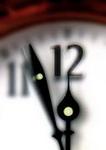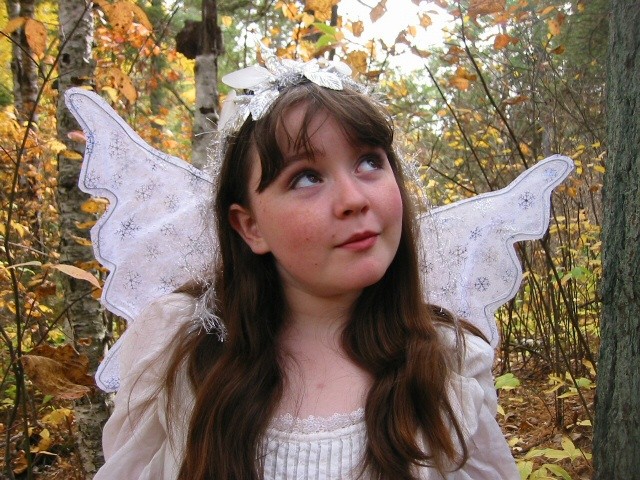Into the Moral Labyrinth
A Theological Review of Pan's Labyrinth

Pan's Labyrinth (El Laberinto del Fauno) is a new fairy tale, but it's also from the pre-Disney world of fairy tales. As such it is magical, brutal, gruesome, mysterious, and full of wonder. This movie is honest about its R rating and is definitely not for the faint of heart. It is also one of the best cinematic studies of dealing with violence I have seen in quite some time.
The film is set in 1944 Fascist Spain right after the Spanish Civil War. Ofelia, a young girl, and her pregnant mother go to stay at a military outpost to be with Ofelia's new stepfather and the father of her unborn sibling. Her new stepfather is a Captain charged with hunting down the remaining rebels hiding out in the woods and he does so brutally and without remorse.
 Ofelia is entranced by fairy tales which she reads constantly. She finds an ancient labyrinth in the woods near the compound which she visits one night. At the center of the labyrinth she encounters a faun who tells her she is the long-lost daughter of the King of the Underworld and gives her three tasks to prove her royal lineage. These are also a test to make sure that her soul hasn't gone native to this realm and that she is still worthy of her royal title.
Ofelia is entranced by fairy tales which she reads constantly. She finds an ancient labyrinth in the woods near the compound which she visits one night. At the center of the labyrinth she encounters a faun who tells her she is the long-lost daughter of the King of the Underworld and gives her three tasks to prove her royal lineage. These are also a test to make sure that her soul hasn't gone native to this realm and that she is still worthy of her royal title.
[Warning: Major spoilers follow. I completely give away the ending. Read on only if you've seen the film or never intend to do so. You've been warned.]
The bulk of the movie deals with one question: How does one contend with overwhelming, tyrranical violence? The Captain, Ofelia's stepfather, uses violence as a tool to achieve his goals, professional and personal, and he does it without apology or, apparently, feeling. Ofelia's labyrinthine winding path consists not only of doing the tasks assigned to her by the faun, but also trying to keep out of the way of her tyrranical stepfather.
 Many people make hard choices regarding how to deal with the Captain's violence. The rebels, of course, engage in a deadly game of hide and seek with him. Mercedes, a housekeeper in the compound, secretly helps the rebels and tries to do her job without being found out as a spy. A doctor, likewise, is serving the Captain by helping out his new, ailing, pregnant wife and helping the rebels in the woods.
Many people make hard choices regarding how to deal with the Captain's violence. The rebels, of course, engage in a deadly game of hide and seek with him. Mercedes, a housekeeper in the compound, secretly helps the rebels and tries to do her job without being found out as a spy. A doctor, likewise, is serving the Captain by helping out his new, ailing, pregnant wife and helping the rebels in the woods.
One of the most poignant moments in the film is when the doctor helps a torture victim die in defiance of the Captain's orders. When confronted by the Captain he calmly tells him that to "obey for obey's sake... That's something only people like you do." He then takes up his doctor's bag and walks away and is summarily executed by the Captain.
 In the end Ofelia has a similar choice. She is told that she can enter the fairy realm and become a princess if she allows the faun to spill the blood of her newborn brother. She refuses, even with the knowledge that her bloodthirsty stepfather is pursuing her and choosing not to sacrifice her brother means her almost certain death. Indeed, she sacrifices herself for her brother.
In the end Ofelia has a similar choice. She is told that she can enter the fairy realm and become a princess if she allows the faun to spill the blood of her newborn brother. She refuses, even with the knowledge that her bloodthirsty stepfather is pursuing her and choosing not to sacrifice her brother means her almost certain death. Indeed, she sacrifices herself for her brother.
The film concludes with wondrous ambiguity. Ofelia both reassumes her throne in the fairy realm exactly because of her selflessness and, simultaneously, lies dying in the arms of the bereaved Mercedes.
 The movie's tag line - "Innocence has a power evil cannot imagine." - points directly to the core gospel message of the story. Evil cannot be overcome by evil, but only by good. Ofelia succeeds not because she succumbs to the violence around her, but because she will not be corrupted by it. In the end, like the doctor, she defies her stepfather with the knowledge he can kill her. But what he does not know is that he cannot take her life.
The movie's tag line - "Innocence has a power evil cannot imagine." - points directly to the core gospel message of the story. Evil cannot be overcome by evil, but only by good. Ofelia succeeds not because she succumbs to the violence around her, but because she will not be corrupted by it. In the end, like the doctor, she defies her stepfather with the knowledge he can kill her. But what he does not know is that he cannot take her life.
The comparisons to Jesus' contending with the powers of the world are almost too obvious. Like Ofelia, Jesus lives in a land that is tyrannized and occupied. Like Ofelia, Jesus believes that his true source, his true father, is not of this world. Like Ofelia, Jesus confronts those who wield violence brutally and without remorse and tells them that they have no power over him. Like Ofelia, Jesus is tempted many times to stray from the path.
 One could watch this film and think it is an indictment of Christianity and a glorification of Paganism, but I think that would be a shallow reading. The outward church is treated with obvious contempt in the film by depicting clergy who collaborate with the powers of the time. Likewise the film lifts up many seemingly occult or pagan symbols in a more or less positive way. But at its core this film is a retelling of basic Christian principles.
One could watch this film and think it is an indictment of Christianity and a glorification of Paganism, but I think that would be a shallow reading. The outward church is treated with obvious contempt in the film by depicting clergy who collaborate with the powers of the time. Likewise the film lifts up many seemingly occult or pagan symbols in a more or less positive way. But at its core this film is a retelling of basic Christian principles.
While I flinched a lot at the violence of this film, I found the story, the message, and the imagery extremely compelling. I expect to see the faun and the labyrinth in my thoughts, my dreams, and my nightmares for weeks to come.
[The fantasy images from the film are very compelling. I'm currently using the image at the top of this post as my desktop.]




 The last time I had been in that living room was a few weeks earlier. Some members of my church and I had come caroling. The elderly couple positively beamed at the visit. Evelyn grinned from ear to ear. After we had finished singing she rushed about to make sure all the carolers had some treat or another, paying special attention to the children.
The last time I had been in that living room was a few weeks earlier. Some members of my church and I had come caroling. The elderly couple positively beamed at the visit. Evelyn grinned from ear to ear. After we had finished singing she rushed about to make sure all the carolers had some treat or another, paying special attention to the children. You know, it's interesting what people decide to blog on. My
You know, it's interesting what people decide to blog on. My  Out in the sanctuary sits the funeral lady in her fake fur coat and garish head scarf. She is old and I only see her at funerals. In the last three years I've been here she's been at almost every funeral I've presided over. She's not a member of the church. I've heard her name, but it has slipped from memory. She always lets me know how much the deceased meant to her and how she knew the whole family, but that's an act. She's just the funeral lady. Like a grim reaper with bad fashion sense I can trust her to show up on the scene.
Out in the sanctuary sits the funeral lady in her fake fur coat and garish head scarf. She is old and I only see her at funerals. In the last three years I've been here she's been at almost every funeral I've presided over. She's not a member of the church. I've heard her name, but it has slipped from memory. She always lets me know how much the deceased meant to her and how she knew the whole family, but that's an act. She's just the funeral lady. Like a grim reaper with bad fashion sense I can trust her to show up on the scene.
